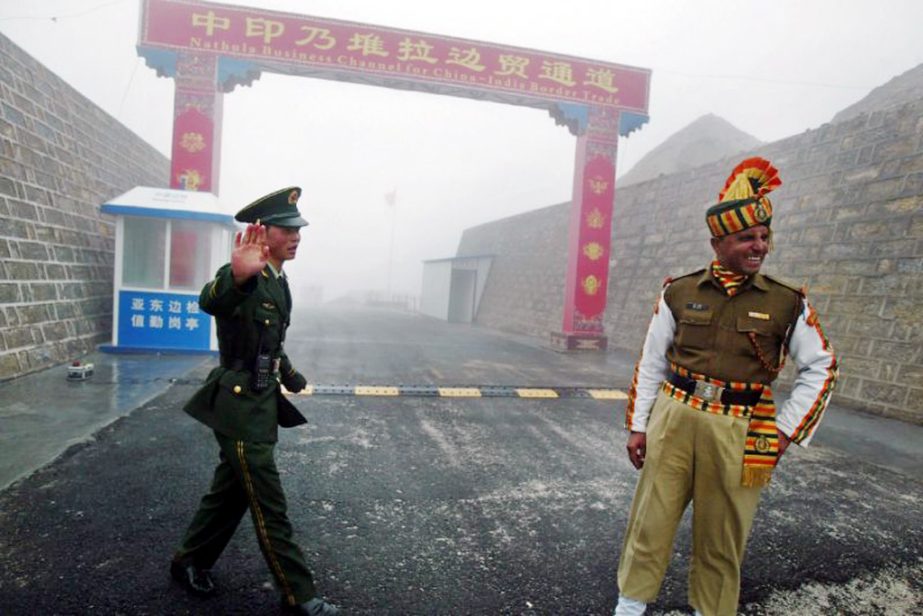
AFP, New Delhi :
A top Indian diplomat said China is being unusually aggressive in a month-old border dispute with India that shows no sign of easing, media reports said Wednesday.
Beijing has made virtually daily warnings to its neighbour over the deadlock on a remote Himalayan plateau, where Indian and Chinese troops have been locked in a tense face off.
Foreign Secretary S. Jaishankar told lawmakers in a closed briefing on the dispute that India wanted a diplomatic settlement, the reports said. “Jaishankar told us that China’s aggression and rhetoric on the recent standoff is unusual,” a member of the parliamentary panel at Tuesday’s briefing told Indian media.
“We will continue to engage with them through diplomatic channels,” the foreign ministry number two was quoted as saying by Press Trust of India news agency.
The dispute concerns land near where the boundaries of China, India and Bhutan meet. China has alleged that Indian troops are on its territory. Bhutan and India say the area-known as the Doklam plateau in India and Donglang to China-is Bhutanese.
Bhutan has no diplomatic relations with China and is closely allied to India, which says its troops approached a Chinese army unit that entered the zone on June 16 to build a road.
China has said it will hold talks with India only after Indian troops are withdrawn from the disputed territory.
China and India have a number of border disputes, although the section currently in question is generally regarded as stable.
The two fought a border war in 1962 in Arunachal Pradesh.
In 2014, hundreds of Indian and Chinese troops faced off on the de facto border known as the Line of Actual Control that runs along the northwest Indian region of Ladakh.
On Tuesday, an Indian junior home minister Kiren Rijiju told parliament that 73 new roads with “operational significance” were being constructed by India along the border, with 30 completed so far.
The latest dispute has triggered international concern, with the visiting Australian foreign minister urging the neighbours to resolve the row amicably.
“We don’t want to see any escalation of tensions that could lead to miscalculation and misjudgement,” Julie Bishop said Wednesday.
The US State Department has flagged concern while calling on the two nations to come up with “some sort of arrangement” for peace.
A top Indian diplomat said China is being unusually aggressive in a month-old border dispute with India that shows no sign of easing, media reports said Wednesday.
Beijing has made virtually daily warnings to its neighbour over the deadlock on a remote Himalayan plateau, where Indian and Chinese troops have been locked in a tense face off.
Foreign Secretary S. Jaishankar told lawmakers in a closed briefing on the dispute that India wanted a diplomatic settlement, the reports said. “Jaishankar told us that China’s aggression and rhetoric on the recent standoff is unusual,” a member of the parliamentary panel at Tuesday’s briefing told Indian media.
“We will continue to engage with them through diplomatic channels,” the foreign ministry number two was quoted as saying by Press Trust of India news agency.
The dispute concerns land near where the boundaries of China, India and Bhutan meet. China has alleged that Indian troops are on its territory. Bhutan and India say the area-known as the Doklam plateau in India and Donglang to China-is Bhutanese.
Bhutan has no diplomatic relations with China and is closely allied to India, which says its troops approached a Chinese army unit that entered the zone on June 16 to build a road.
China has said it will hold talks with India only after Indian troops are withdrawn from the disputed territory.
China and India have a number of border disputes, although the section currently in question is generally regarded as stable.
The two fought a border war in 1962 in Arunachal Pradesh.
In 2014, hundreds of Indian and Chinese troops faced off on the de facto border known as the Line of Actual Control that runs along the northwest Indian region of Ladakh.
On Tuesday, an Indian junior home minister Kiren Rijiju told parliament that 73 new roads with “operational significance” were being constructed by India along the border, with 30 completed so far.
The latest dispute has triggered international concern, with the visiting Australian foreign minister urging the neighbours to resolve the row amicably.
“We don’t want to see any escalation of tensions that could lead to miscalculation and misjudgement,” Julie Bishop said Wednesday.
The US State Department has flagged concern while calling on the two nations to come up with “some sort of arrangement” for peace.

